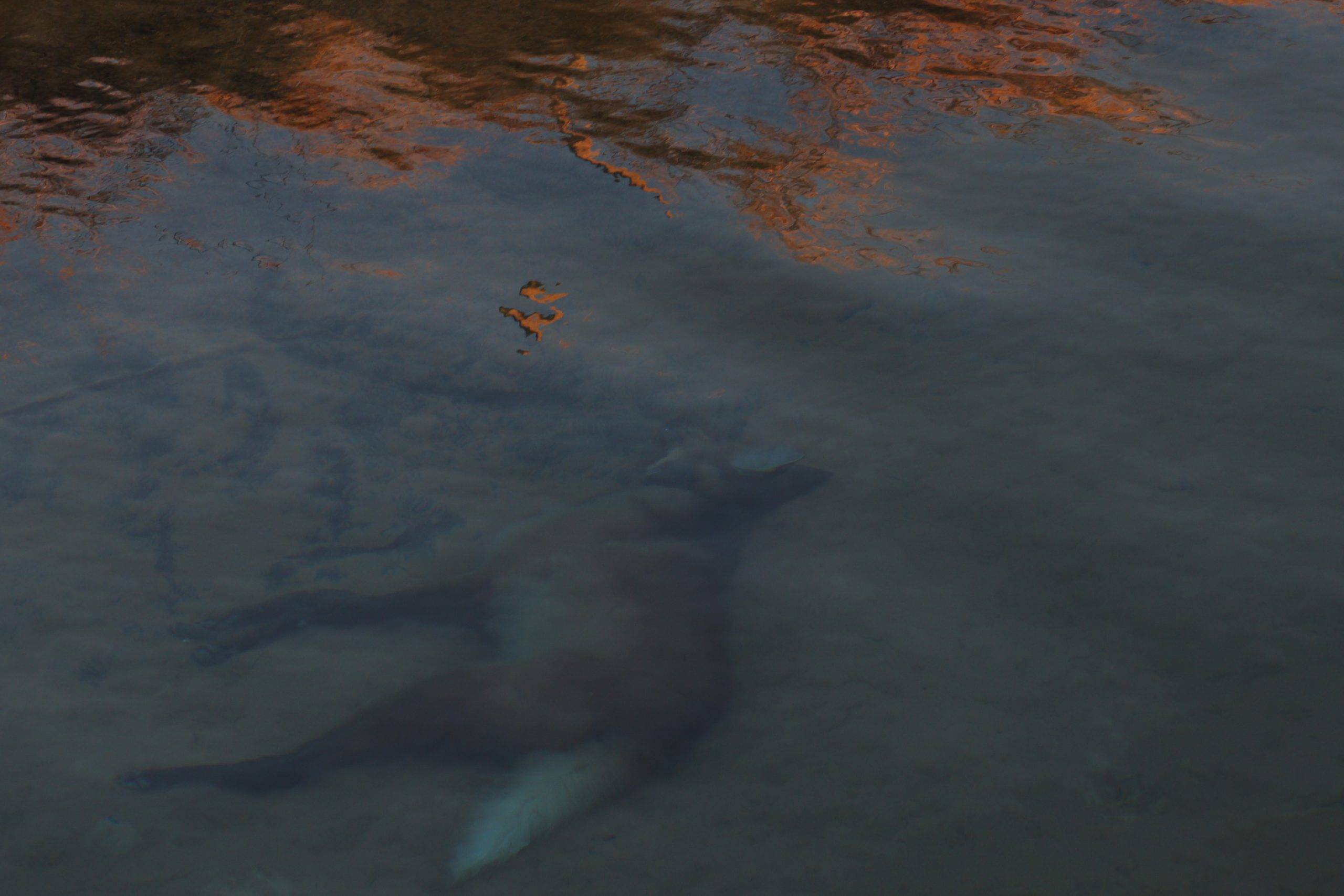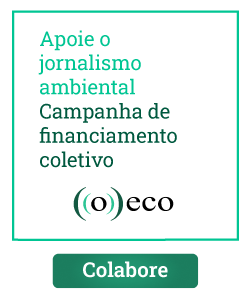Deforestation, drought, private sector and government negligence have turned irrigation channels into a deadly trap for wildlife, including those at risk of extinction. The problem could be widespread, and urgent actions are needed to prevent further deaths.
Large soybean and other grain plantations dominate western Bahia, in northeast Brazil. The crops of this expanding agricultural frontier depend heavily on irrigation, which damaging effects on biodiversity are beginning to gain light.
Between June and August, three maned wolves drowned to death in water channels, an adult female and two of her three juvenile offspring. The animals were discovered only because they were being monitored with radio collars.
“Imagine how many other animals are falling and dying without our knowledge,” warned Rogério Cunha de Paula, coordinator of a government research and conservation center for carnivorous mammals, the CENAP, by phone.
With long legs and orange fur, the maned wolf is an elegant relative of foxes, dogs, and other wolves. The species is vulnerable to extinction in Brazil, where its numbers have decreased by a third over the past two decades due to deforestation, hunting, roadkills, and diseases transmitted by domestic animals.
Its mainly habitat is the Cerrado biome, a savannah distributed in the central region of the country. By consuming native fruits and spreading their seeds through feces, they provide an ecological service by helping to keep trees and other native plants.
Other victims of the canals, one armadillo and a small wild cat were found drowned, along with various rodents and an owl. The bird may have fallen while attempting to drink water or devour the rodents.
Sources, who requested anonymity, reported via email that numerous carcasses are collected weekly from the canals in western Bahia. The area also has large water reservoirs for the crops, which can also attract wildlife.



Fatal traps
Irrigation channels are lined with a plastic membrane to make them watertight, but that prevents animals from escaping, causing them to agonize to death while trying to climb the slippery walls.
Each of these structures can span tens of kilometers. When installed, fences along these “artificial rivers” do not block animal access because they are often low, damaged, or even made of fragile plastic.
“To save money, fences are not deployed or are very rudimentary. State legislation also does not specify the type of structures to be installed,” emphasized Rogério Cunha de Paula of CENAP.
Maned wolves cover up to 40 kilometers (25 miles) daily along routes in natural areas or even deforested and converted into farmland. When they encounter water channels, they fall while attempting to cross them, much like they would in front of a road or highway.
“Animals also seek water in a naturally arid region, where the resource is increasingly used by agribusiness,” said by phone César Victor do Espírito Santo, project coordinator at the NGO Pro-Nature Foundation, the Funatura.


Severe losses
The losses in the irrigation channels are very concerning for the ecological balance of the region. The deaths of the wolves weakened their local population – They represent 30% to 40% of the species population in that area – as well as hindered research that was being done on the species’ behavior.
“If so many dead animals were identified in the short term, we are far from knowing the real extent of the problem [caused by irrigation channels in western Bahia and in the country],” declared Rogério Cunha de Paula of CENAP.
The area where wolves and other species drown is located immediately north of Grande Sertão Veredas national park and a private farm, whose preserved 2,640 square kilometers (1,019 square miles) serve as a major refuge for native species, including jaguars.The park is part of the Sertão Veredas-Peruaçu Mosaic, a block of nearly 18,000 square kilometers (6,950 square miles) with protected areas, the Xakriabá Indigenous Land and traditional communities territories.

César Victor of Funatura reports that wild animals have also drowned at least one other project in the municipalities of Jaíba, Matias Cardoso, and Verdelândia, in the state of Minas Gerais. There, 548 kilometers (340 miles) of channels have been installed, since 1975.
“The expansion of crops is accompanied by deforestation, wildfires, the isolation of protected areas, and significant damage to biodiversity, but agribusiness remains unchanged in its approach,” says the specialist.
Brazilian NGOs have analyzed that from 2007 to 2021, the Bahia Government authorized deforestation of 9,930 square kilometers (3,834 square miles), with 80% of it in the western state. This area is equivalent to three times the territory of Washington, DC.
Deforestation alerts by the Amazon Environmental Research Institute, the Ipam, indicate 4,940 square kilometers (1,907 square miles) cleared from January to August in the agricultural frontier between Maranhão, Tocantins, Piauí, and Bahia states. It represents 75% of this year’s losses in the Cerrado, of 6,580 square kilometers (2,540 square miles).
In Bahia, 87 square kilometers (34 square miles) were deforested only in August, a 5.3% increase compared to the same month last year. In the western state, municipalities like São Desidério , Correntina, and Jaborandi have been among the leaders in Cerrado clearance since the beginning of 2023.
Dried lives
There are around 85,000 square kilometers (33,000 square miles) of irrigated crops in Brazil, equivalent to half the territory of Uruguay. According to the federal government, there is potential to irrigate more 550,000 square kilometers (212,000 square miles).
Brazilian NGOs have counted 835 irrigation permits issued in western Bahia by its state government, between 2007 and 2022. These permits amount to 17 billion liters of water daily, drawn from underground sources or rivers.
The volume of water could supply daily seven times the population of the entire state of Bahia, which is 15 million people, or nine times the population of the city of São Paulo, capital of São Paulo state, with approximately 12 million inhabitants.
According to Brazilian civil organizations analysis, this massive and unregulated issuance of deforestation and irrigation permits serves as the foundation for “state policies” aimed at the elimination of the Cerrado and the privatization of water resources, kept by the state government.


The deadly scenario has prompted experts to call for an urgent scanning of the impacts on wildlife from irrigation channels, legislative changes, and licensing reforms to mitigate biodiversity losses in the Cerrado and other biomes.
First steps would be to install good fences where they do not exist, reinforce and repair those that have been installed along the channels. Then, it is necessary to create wildlife crossings over watercourses to prevent the isolation of fauna in large territories.
“We will need an overview to make the best decisions, including for the benefit of agribusiness,” pointed out Rogério Cunha de Paula of CENAP. After all, global markets are becoming increasingly attentive to biodiversity losses, he adds.
In 2022, Bahia’s agribusiness exports totaled $ 6.37 billion, an increase of 27.53% over the previous year, according to the state government. Sales go mainly to the United States, the European Union and Mercosur.
The same source indicates that soybeans, extensively cultivated in western Bahia, accounted for half of the state’s agribusiness exports, totaling $ 3.42 billion. Bahia represents 4% of Brazil’s agribusiness exports, which amounted to $ 159 billion last year.
The numbers would demand more responsibility from the sector, which is a major driver of deforestation and wildlife suffering in Brazil. “Animals are dying while agribusiness maintains sustainability in its speech,” complained César Victor of Funatura.
According to the expert, the deaths that are beginning to be recorded in irrigation channels demands a national in-depth debate on the real costs of rural production and commodities exports. “There is no real sustainability in agribusiness,” he said.
“We live in a fantasy world to facilitate the acceptance of products by the Brazilian public and international buyers,” added César Victor, also Forest Engineer by the University of Brasília (UnB).
At same time, Monique Fonseca, a lawyer specialized in Environmental Law and Agribusiness, reinforced that these impacts turn positive externalities, such as a balanced environment, into negative externalities, such as pollution and wildlife losses.
“We need better command and control policies and market mechanisms for a real behavior change by individuals and private sector,” evaluated by video call the expert, who is associated to the Laclima, a network of climate lawyers in Latin America.
Contacted by ((o))eco, the Bahia Government remained silent on the impacts and measures that could be taken to quantify and mitigate the deaths of wildlife.
Leia também

A Last Chance for Animals and Plants Extinct in the Wild
Study maps 72 species of animals and plants that are now confined to zoos and botanical gardens, on the brink of complete extinction →

BlackRock’s $400m stake in Amazon meatpackers defies sustainability cred
Wall Street fund manager BlackRock administers 2.2 billion reais ($408 million) in shares in the three largest Brazilian meatpackers operating in the Amazon today. The cattle purchase and slaughter operations of JBS, Marfrig and Minerva involve 6.9 million hectares (17 million acres) of land at high risk of deforestation. That puts BlackRock’s investments at odds with →

Criminal frontiers
A global center of illegal trade in goods, the borders between South American countries have become a target for the growing and lucrative international trafficking of agrotoxics. →









